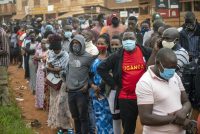
Long-serving African presidents say the people want them to stay on. Is that true?
At his first inauguration in 1986, Ugandan President Yoweri Museveni famously blamed Africa’s problems on leaders who stay in power for too long. Thirty-five years later, he’s settling into his sixth term in office.
Museveni is just one of many African presidents who have maintained their hold on power by circumventing, modifying or eliminating constitutional clauses limiting presidents to a maximum of two terms. Just last year, Alpha Condé of Guinea and Alassane Ouattara of Côte d’Ivoire followed the well-trodden trail blazed by Azali Assoumani of the Comoros, Paul Kagame of Rwanda, Paul Biya of Cameroon, Denis Sassou Nguesso of the Republic of Congo and Ismail Guelleh of Djibouti, among others.… Seguir leyendo »



